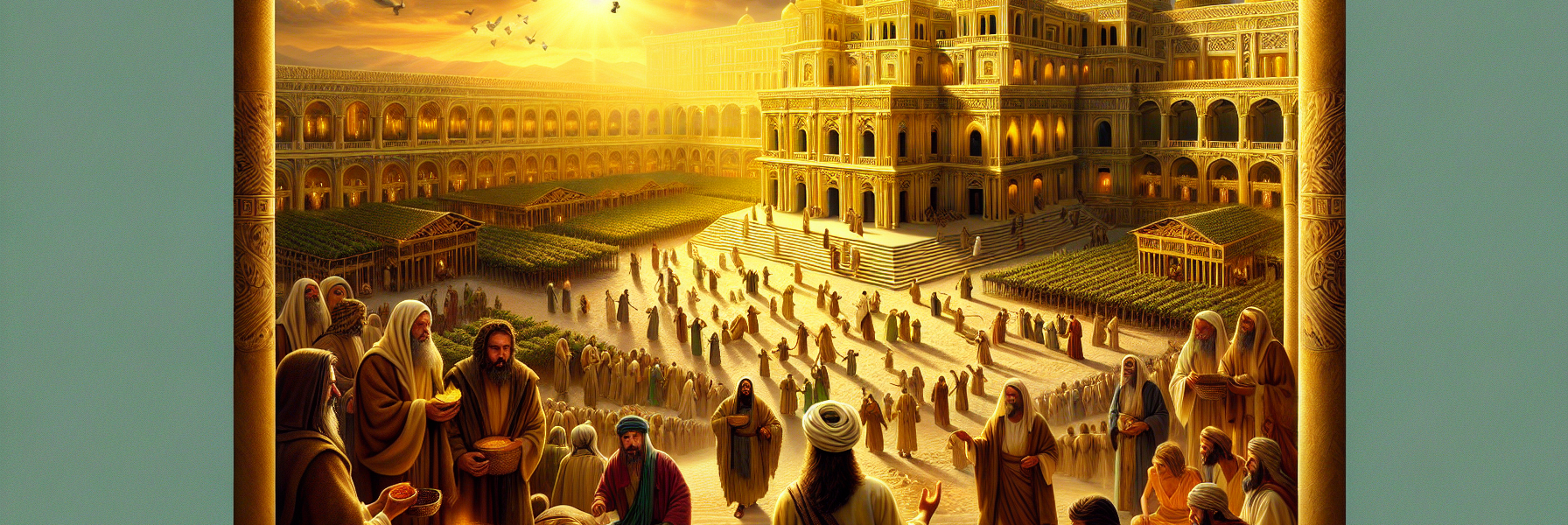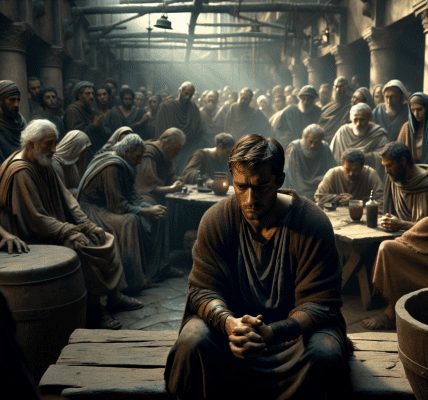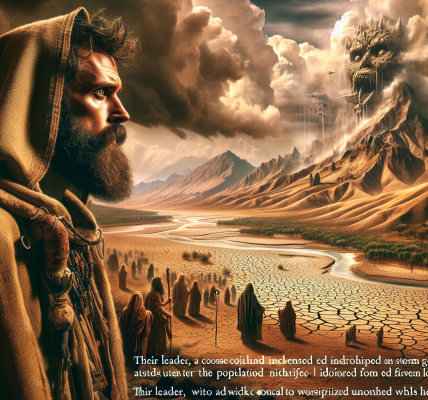**The Widow’s Offering and the Wisdom of Jesus**
The sun hung low over Jerusalem, casting golden light upon the great Temple, its white stones gleaming like polished ivory. The courts buzzed with activity—merchants selling sacrificial animals, scholars debating the Law, and pilgrims from distant lands offering prayers. Among them walked Jesus, His presence commanding reverence, His eyes seeing beyond the surface of men’s hearts.
### **The Parable of the Wicked Tenants**
As He taught, the chief priests, scribes, and elders watched Him with suspicion, their faces tight with disapproval. They had questioned His authority before, but now, sensing their hardened hearts, Jesus spoke a parable:
“A man planted a vineyard,” He began, His voice steady and clear, “and set a hedge around it, dug a pit for the winepress, and built a tower. Then he leased it to tenants and went into a far country.”
The crowd leaned in, sensing the weight of His words.
“When the time came, the owner sent a servant to collect his share of the fruit. But the tenants beat him and sent him away empty-handed. Again, the owner sent another servant, and they struck him on the head and treated him shamefully. He sent yet another, and they killed him. Many others they beat or killed.”
A murmur rippled through the listeners. Jesus continued, His gaze piercing.
“Finally, the owner sent his beloved son, saying, ‘Surely they will respect my son.’ But the wicked tenants said among themselves, ‘This is the heir! Come, let us kill him, and the inheritance will be ours!’ So they seized him, murdered him, and cast him out of the vineyard.”
Silence fell. Then Jesus asked, “What then will the owner of the vineyard do? He will come and destroy those tenants and give the vineyard to others.”
The religious leaders stiffened, their faces darkening. They knew He spoke of them—the unfaithful stewards of God’s people—and of His own coming death. They longed to arrest Him, but fear of the people held them back.
### **Paying Taxes to Caesar**
Soon, Pharisees and Herodians—unlikely allies—approached Jesus, their smiles false, their words dripping with flattery. “Teacher,” they said, “we know You are true and care for no one’s opinion. Is it lawful to pay taxes to Caesar, or not?”
Jesus saw their trap. If He said yes, the people might turn against Him. If He said no, the Romans would accuse Him of rebellion.
“Bring Me a denarius,” He said.
A coin was handed to Him. Holding it up, He asked, “Whose likeness and inscription is this?”
“Caesar’s,” they answered.
“Then render to Caesar the things that are Caesar’s,” He said, “and to God the things that are God’s.”
Stunned, they fell silent. His answer transcended their schemes, reminding them that while earthly rulers demanded taxes, God demanded their very souls.
### **The Sadducees and the Resurrection**
Next came the Sadducees, who denied the resurrection. With smug confidence, they posed a riddle:
“Teacher, Moses wrote that if a man’s brother dies, leaving a wife but no child, the brother must take the widow and raise offspring for his brother. Suppose seven brothers each marry her in turn, and all die childless. In the resurrection, whose wife will she be?”
Jesus shook His head. “You are mistaken,” He said, “because you know neither the Scriptures nor the power of God. In the resurrection, they neither marry nor are given in marriage but are like angels in heaven. And concerning the dead being raised, have you not read in the Book of Moses how God said, ‘I am the God of Abraham, the God of Isaac, and the God of Jacob’? He is not God of the dead, but of the living.”
The crowd marveled. Even some scribes admitted, “Teacher, You have spoken well.”
### **The Greatest Commandment**
A scribe, hearing Jesus’ wisdom, stepped forward with sincerity. “Which commandment is the most important of all?”
Jesus answered without hesitation:
“The most important is, ‘Hear, O Israel: The Lord our God, the Lord is one. And you shall love the Lord your God with all your heart, with all your soul, with all your mind, and with all your strength.’ The second is this: ‘You shall love your neighbor as yourself.’ There is no commandment greater than these.”
The scribe nodded in approval. “You are right, Teacher. To love God and neighbor is more than all burnt offerings and sacrifices.”
Seeing his understanding, Jesus said, “You are not far from the kingdom of God.”
### **The Widow’s Offering**
As the day waned, Jesus sat near the treasury, watching people drop their offerings into the collection boxes. The rich came forward, tossing in large sums with great ceremony. Then came a poor widow, her garments worn, her face lined with hardship.
Quietly, she dropped in two small copper coins—a mite, the smallest of all currency.
Calling His disciples, Jesus said, “Truly, I tell you, this poor widow has put in more than all those who are contributing to the treasury. For they gave out of their abundance, but she, out of her poverty, has put in everything she had—all she had to live on.”
The disciples gazed at her in wonder. In God’s eyes, her sacrifice outweighed the wealth of kings.
### **The Lesson of the Day**
As evening shadows stretched across the Temple courts, Jesus departed, leaving behind lessons of true devotion:
– **Faithfulness matters more than position.**
– **God sees the heart, not the outward show.**
– **Love for God and neighbor is the essence of the Law.**
– **True giving is measured by sacrifice, not amount.**
The religious leaders seethed, but the humble rejoiced—for the kingdom of God belonged to such as these.




